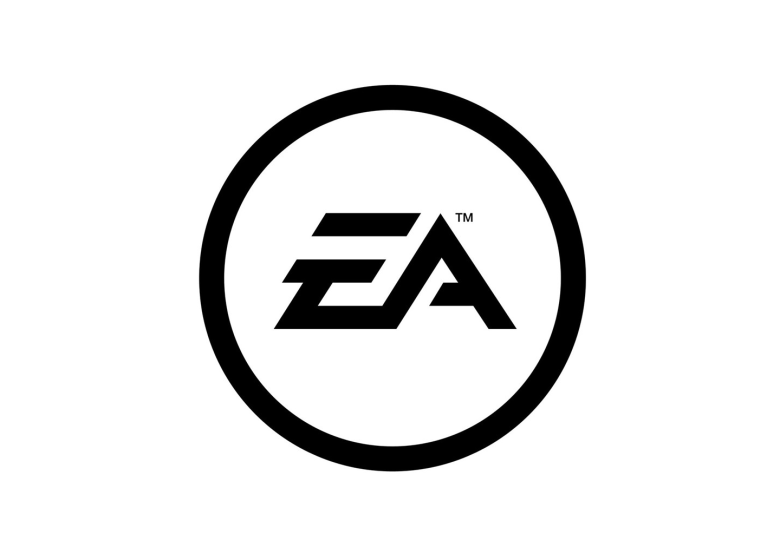
EA shut down Visceral Games on October 17, 2017. The studio was most famous for bringing life to the Dead Space franchise.
While this news came as a shock to many, it’s nothing new. This is just one in a long list of studios EA bought and then shut down over nearly 20 years.
Here are all of the studios killed off by the publisher listed in order of the dates they were shut down.
1. Bullfrog Productions (1987 – 2001)
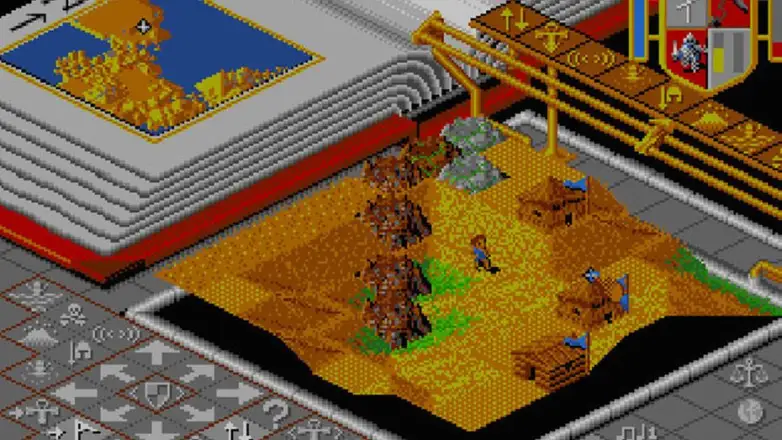
OriginPopulous (1989)
UK-based Bullfrog Productions was founded in 1987 by Les Edgar and Peter Molyneux. Since then, they made a name for themselves creating smash hit games like Populous, Syndicate, Theme Park, and Dungeon Keeper. Populous is especially important as many credit it with creating the “God game” genre.
Bullfrog had been a strategic partner with EA in designing and developing games for seven years before EA acquired them in January 1995, according to AllBusiness. Molyneux was made Vice President of Electronic Arts and head of their European studio, but after growing frustrated with the position he decided to resign in July 1996 according to GameSpot. He would go on to found Lionhead Studios before moving on from that to 22Cans. Edgar became Vice President of the European studios and Bullfrog’s Chairman, but stepped down in 1999.
Bullfrog tried developing Genesis: The Hand of God and Dungeon Keeper 3 but both projects were cancelled. In 2001, Bullfrog was merged into EA UK, effectively ending its existence. The final title to bear the company’s logo was Theme Park Inc.
Other employees of Bullfrog would go on to form other studios such as Mucky Foot Productions (Blade II) and Media Molecule (LittleBigPlanet).
Many game franchises created by Bullfrog would later be rebooted under EA, but we’ll get to that later.
2. Westwood Studios (1985 – 2003)
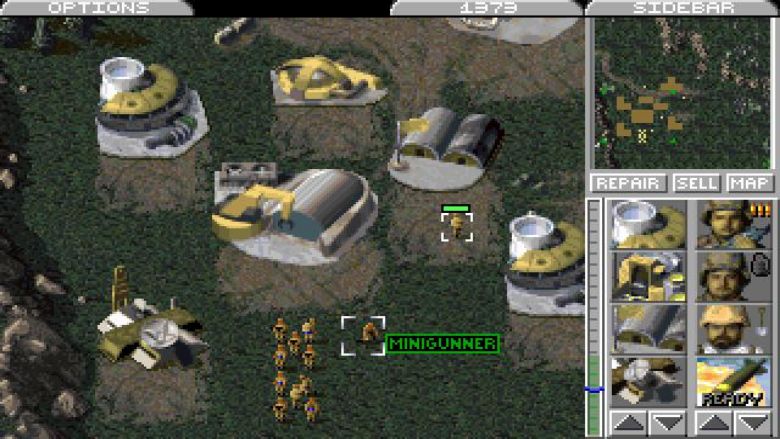
Westwood StudiosCommand & Conquer (1995)
In 1985, Louis Castle and Brett W. Sperry founded Westwood Associates in Las Vegas, Nevada. It was renamed Westwood Studios in 1992 when the company merged with Virgin Games (Later known as Virgin Interactive Entertainment). According to an old GameSpy interview with Castle, the “Westwood” part of the name was inspired by the “entertainment meets professional” character of Westwood, California. Westwood Studios are best known for the Command & Conquer series, one of the first and most popular real-time strategy games at the time.
In 1998, EA acquired the company as well as Virgin Interactive’s development studio in Irvine, California for $122.5 million dollars, as reported by CNN Money. However, the studio was shut down in March 2003 because Command & Conquer: Renegade failed to meet expectations, according to GameSpy. Ex-employees of Westwood Studios would go on to create Petroglyph Games, known for Star Wars: Empire at War.
3. Origin Systems (1983 – 2004)
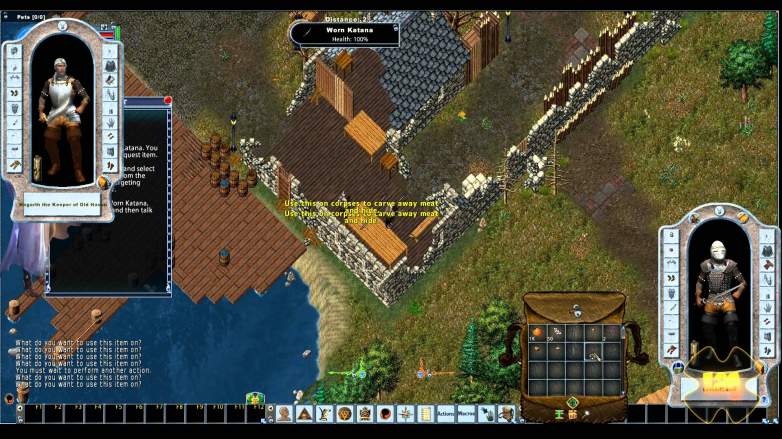
Origin SystemsUltima Online (1997)
Origin was founded in 1983 by Richard and Robert Garriott in Austin, Texas. Richard was developing games since high school and started the company with $70,000 in family money, according to The Escapist.
The company’s slogan was “We create worlds,” and that’s exactly what they were known for. The company was best known for the Ultima series, with Ultima Online being often credited with popularizing and laying the groundwork for massively multiplayer online role playing games. Ultima Online won eight world records in the Guiness World Records: Gamer’s Edition 2008 including “First MMORPG to reach 100,000 players” and “Longest running MMORPG.” Ultima Online also won the GDC Online Awards Hall of Fame during the 2010 Game Developers Choice Online Awards and Lead Designer Raph Koster won the Online Game Legend Award during the 2012 Game Developers Choice Online Awards. Origin Systems are also well known for their Wing Commander and Crusader franchises. They also published the original System Shock which was developed by Looking Glass Technologies.
Warren Spector worked at the company from 1989 to 1996 working as a producer for Ultima Underworld and System Shock before joining Ion Storm Inc. to create Deus Ex. John Romero worked as a programmer for the company for a year before co-founding id Software, creators of Doom.
Origin was acquired by EA in 1992 for $35 million in stock, according to The Escapist. After the success of Ultima Online, EA decided that Origin would be an online-only company. After the poor critical and commercial reception of Ultima IX, however, EA cancelled Origin’s new development projects including Ultima Online 2, Privateer Online, and Harry Potter Online. Richard left to found Destination Games in 2000 with a lot of the team from Ultima IX and Ultima Online joining him, according to an interview. Origin was then made to support Ultima Online and develop other online games such as Ultima X: Odyssey set to be released in 2004. The studio was disbanded in February 2004.
EA would use the trademark for Origin it acquired when it purchased Origin Systems for its digital distribution software Origin which launched in February 2013. Origin would go on to court controversy after controversy including making Crysis 2 an exclusive and removing it from Steam, account bans, security weaknesses, and accusations of spying.
Destination Games became the American branch of the Korean online game studio NCSoft, according to The Escapist. The studio released one game, Tabula Rasa, which failed to meet sales expectations. Richard left the studio in 2008 and the studio closed in February 2009.
4. NuFX (1990 – 2007)

NuFXNBA Street Vol. 2 (2003)
Chicago-based NuFX was incorporated in 1990 by Lou Haehn and Patrick Quinn. EA published 15 of their games including the popular NBA Street series and in February 2004 the publisher acquired them, according to GameSpot. Gamasutra reported that their name was then changed to EA Chicago. The studio closed down in November 2007.
5. Pandemic Studios (1998 – 2009)
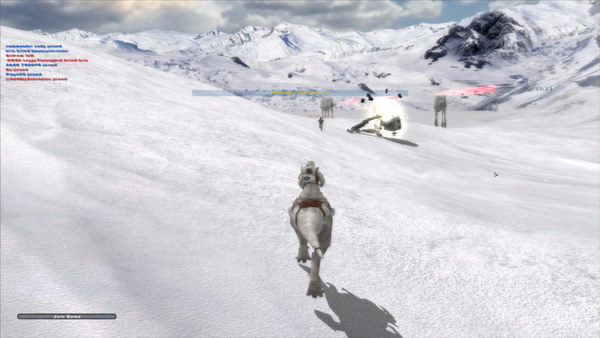
Star Wars Battlefront II (2005)
Pandemic Studios was founded in 1998 by an equity investment by Activision and had offices in Australia and California. Their first two games, Battlezone II: Combat Commander and Dark Reign 2, were both sequels to games published by Activision.
Pandemic would continue to create hit games such as Mercenaries: Playground of Destruction, Destroy All Humans!, and Full Spectrum Warrior. Full Spectrum Warrior is especially unique because not only was it commissioned by the US Army to help train soldiers but the University of Southern California and the Institute of Creative Technologies adapted the game to treat post traumatic stress disorder. But the games Pandemic would be most known for was Star Wars Battlefront and its sequel, third-person, team-based multiplayer shooters set in the Star Wars universe.
In 2005, Pandemic partnered with BioWare in a $300 million deal by Elevation Partners, a private equity firm lead by former EA President John Riccitiello as reported by Eurogamer. The two studios were then acquired by EA in 2007 when they purchased VG Holding Corp which owned both studios, according to Giant Bomb.
According to YouTube channel DidYouKnowGaming?, Pandemic’s acquisition by EA meant that they could no longer work on Star Wars games with LucasArts, which lead to issues when developing the eventually cancelled Star Wars Battlefront III.
Pandemic then got to work on a licensed game based on the Batman film The Dark Knight. Pandemic began work even without any info about the movie, and the game switched from a more linear adventure title to a more ambitious open world one as development progressed according to DidYouKnowGaming?. However an overestimation of the power of the game engine led to the first playable build of the game struggling to run and even crashing development kits, causing members of the studio to leave. The game would never be able to make it in time for the movie’s release on July 2008, but could make the blu-ray release in December 2008. Development would continue to be plagued by technical issues and pressure to release the game would only increase when actor Gary Oldman revealed the game’s existence to G4. The $100 million project was cancelled in October 2008.
EA closed the Brisbane, Australia offices for Pandemic on Christmas, 2008 and completely shut down the studio in November 2009, laying off over 200 employees according to DidYouKnowGaming?. According to Kotaku, the closure was also part of EA’s plans for cost-cutting at the time, which included the elimination of 1,500 jobs, cutting a dozen games, and closing facilities.
EA would reboot the Star Wars Battlefront franchise in 2015 with the help of Battlefield developer DICE. However the reboot was widely criticized for a lack of content, most notably the lack of a single player campaign. EA’s Patrick Soderlund admitted in an investor broadcast that the game didn’t include a single player campaign because they wanted to release the game in time for the release of The Force Awakens, as Eurogamer reported.
Star Wars Battlefront II in 2017 was even more controversial. While EA included the promised single player campaign, the game was eviscerated by the community for its loot box system. The Star Cards included in the loot boxes granted noticeable gameplay advantages to players including healing HP after kills or having lower cooldowns for abilities, as IGN reported. By spending real money on loot boxes, players could achieve superiority over others even if they barely touched the game. The game also deliberately made player progression feel like a grind to get loot boxes and credits to make the loot boxes more appealing, with one Reddit user figuring out that it would take 40 hours to get the 60,000 credits needed to unlock Luke Skywalker or Darth Vader through normal play and without buying loot boxes. EA responded to the backlash this caused on Reddit by saying that the intent was “to provide players with a sense of pride and accomplishment for unlocking heroes.” That response received over -668,000 points on Reddit making it the most downvoted comment in the website’s history.
EA would later temporarily remove the ability to purchase premium currency in the game as well as reduce the cost of heroes while also reducing the credits awarded for completing the campaign. These changes came not only from the backlash but reportedly because of pressure from Disney executives who grew upset over the backlash according to the Wall Street Journal. At the time, EA told investors that turning off the microtransactions would have no material impact on the game’s projected earnings according to PC Gamer. The game sold over nine million copies by January 2018, which was one million fewer than EA projected according to the Wall Street Journal. The publisher then reintroduced microtransactions in April 2018 while only letting players buy cosmetic items according to Engadget.
The controversy led to many government entities around the world investigating the effects of loot boxes on players and whether or not they could be considered gambling and regulated as such, including the Belgium Gaming Commission who declared loot boxes to be gambling according to BBC. Hawaii State Representative Chris Lee called Star Wars Battlefront II “an online Star Wars-themed casino designed to lure kids into spending money.” The Hawaii state legislature is now considering two sets of bills that would prohibit retailers from selling games with loot box systems to people under age 21 and would require publishers to disclose the odds of finding certain items in loot boxes, according to Ars Technica.
6. PlayFish (2007 – 2013)

PlayfishThe Sims Social (2011)
Playfish was founded in 2007 by Kristian Segerstrale, Sebastien de Halleux, Sami Lababidi, and Shukri Shammas. The London-based studio developed games on Facebook and was one of the first developers to attract millions of users to their games on the platform.
In 2009, EA acquired the company for $400 million, according to The Guardian. In 2011, Playfish revealed that its games are played by over 55 million people every month, as reported by Gamasutra.
However, by February 2013 all four founders left the company. Lababidi and Shammas left to found Mindshapes, a studio developing educational games for toddlers. Segerstrale left to return to the world of start-ups, according to Tech Crunch. Segerstrale is now the CEO of mobile game developer Super Evil Megacorp according to his LinkedIn page, which is behind the popular mobile MOBA Vainglory. According to Halleux’s LinkedIn page, he is the COO of Saildrone, Inc. a company designing wind and solar powered ocean drones.
Playfish was shut down in 2013 and all of their games were retired by September 2013. The last game to be retired was Madden NFL 13 Social. The studio would be one of four others closed by EA in 2013.
7. Black Box Games (1998 – 2013)

EA Black BoxNeed for Speed: Hot Pursuit 2 (2002)
The Canadian developer Black Box Games was founded in 1998 by former employees of Radical Entertainment. The studio worked for publishers SEGA, Midway Games, and EA. EA acquired the studio in 2002 and renamed it EA Black Box as it was working on Need for Speed: Hot Pursuit 2, as reported by GameSpot. As well as working on Need for Speed titles, the studio also worked on the Skate series.
In 2008, after EA laid off 10 percent of its worldwide workforce, the publisher closed EA Black Box’s office facilities and moved them to EA Canada’s offices as reported by GameSpot. This comes after the underperformance of several of EA’s games including Mirror’s Edge and EA Black Box’s Need for Speed Undercover.
In 2012, EA confirmed yet more lay-offs for EA Canada and EA Black Box, citing a need to transform the studios towards “high-growth digital formats, including online, social gaming and free-to-play,” a spokesperson told Eurogamer. The studio was then renamed Quicklime Games. In April 2013, the studio was closed along with PopCap Vancouver, according to Game Informer.
8. DreamWorks Interactive (1995 – 2013)
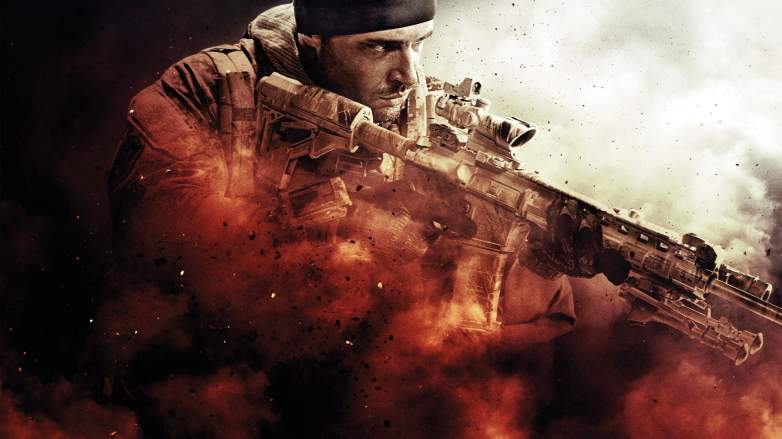
Danger Close GamesMedal of Honor: Warfighter (2012)
DreamWorks Interactive was established as a joint venture by Microsoft and DreamWorks SKG in 1995. The studio was led by Steven Spielberg and created a number of licensed games. Following the success of Medal of Honor, which was published by EA, the publisher bought the company in 2000, merged it with EA Pacific and EA Westwood, and then renamed it to EA Los Angeles. In 2003, EA moved EA Los Angeles along with other studios from Bel Air, California to a new building in Playa Vista, California, as reported by IGN. The studio would go on to create not only more Medal of Honor games but also The Lord of the Rings, James Bond, and even Command & Conquer games.
In order to compete with Activision’s massive cash cow Call of Duty, EA rebranded EA Los Angeles yet again to Danger Close Games in 2010 so that they could make new Medal of Honor games, according to Engadget. Unfortunately, while the 2010 reboot did alright, 2012’s Medal of Honor: Warfighter performed well under sales expectations as it received mediocre reviews. The game series that once pioneered the modern military first-person shooter was now desperately trying to follow Call of Duty’s shadow. The controversy behind the decision to let you play as the Taliban in the 2010 reboot didn’t help matters.
After the reception of Warfighter, EA decided to take the game “out of rotation,” effectively killing the series as reported by PC Gamer. Faced with no game IP’s to work on, Danger Close Games was made a division of EA DICE in May 2013 and was rebranded to DICE Los Angeles where it would go on to make post launch content for entries in EA’s far more successful military shooter series Battlefield 4 and Battlefield 1.
9. Phenomic Game Development (1997 – 2013)
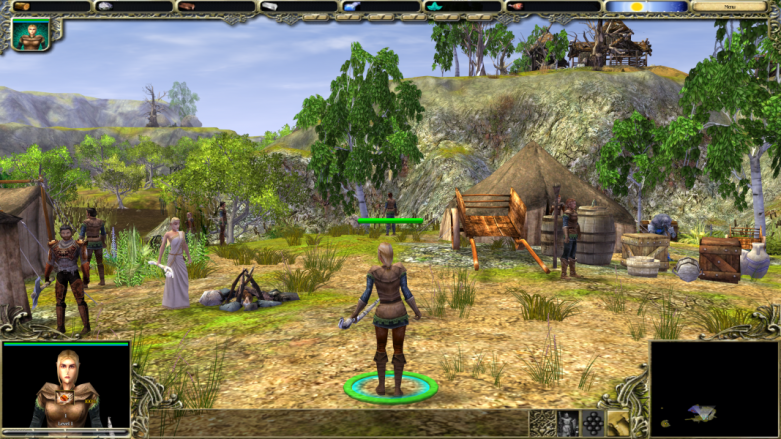
EA PhenomicSpellForce: The Order of Dawn (2004)
The German development studio Phenomic Game Development was established in 1997 by Volker Wertich, known for the major role he played in the Settlers series. The company is known for the SpellForce franchise.
In 2006, EA acquired the studio and renamed it to EA Phenomic. The studio would focus on real time strategy games for EA, according to Eurogamer. The studio would go on to develop BattleForge, Lord of Ultima, and Command & Conquer: Tiberium Alliances. However the studio was closed in July 2013 as part of EA’s restructuring, according to GamesIndustry.Biz.
10. Victory Games (2010 – 2013)
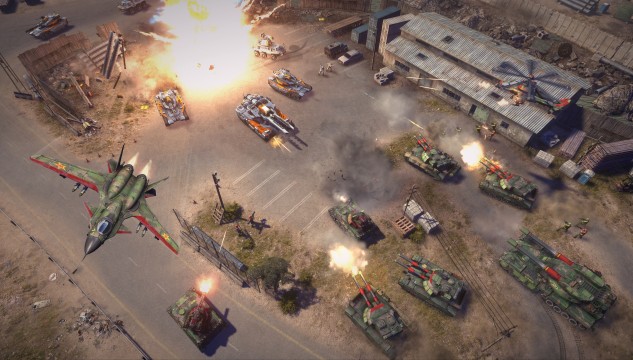
Victory GamesCommand & Conquer (Cancelled)
EA launched Victory Games in 2010 to continue the Command & Conquer series, according to an interview with Vice President of Strategy Games for EA Jon Van Caneghem. The new game would be free-to-play. However, the game was cancelled in October 2013 because of the negative reception from players of the closed alpha test, according to an official statement from Victory Games. The Los Angeles-based studio was then shut down.
During E3 2018, EA announced that the next Command & Conquer game, a mobile title known as Command & Conquer: Rivals, will release in late 2018.
11. Mythic Entertainment (1995 – 2014)
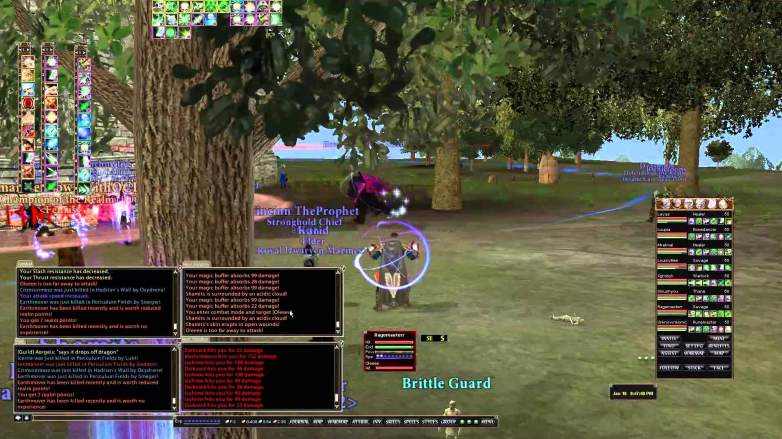
Mythic EntertainmentDark Age of Camelot (2001)
Mythic Entertainment, first known as Interworld Productions, was created in 1995 when game companies Adventures Unlimited Software Inc. and Interesting Systems Inc. joined forces. Their name was changed to Mythic Entertainment in 1997. The studio is best known for Dark Age of Camelot, a well-reviewed MMORPG that far surpassed sales expectations.
In 2003, Mythic sued Microsoft for trademark infringement over their MMO Mythica. After the game was cancelled, Mythic settled the lawsuit and Microsoft agreed not to use the word “Mythica” or similar words for future online games, to drop its US applications to register the word as a trademark, and to give all trademarks and domain names related to the word to Mythic.
In June 2006, EA acquired Mythic so it can produce MMORPGs for them in order to compete with World of Warcraft, according to GameSpot. They also renamed the studio to EA Mythic. Under EA, they released Warhammer Online: Age of Reckoning to critical and commercial success.
In June 2009, EA merged Mythic with BioWare to create one big RPG/MMO group known as BioWare Mythic as part of a restructuring plan, as reported by Kotaku. BioWare’s Co-founder Ray Muzuka took the lead of the studio with the other Co-founder Greg Zeschuk becoming Group Creative Officer as Mythic Co-founder Mark Jacobs left. Mythic’s other Co-Founder Rob Denton stepped up as general manager. In 2012, the studio was changed back to Mythic Entertainment.
Mythic’s career ended after the release of Dungeon Keeper, a 2014 mobile game of the series created by Bullfrog. Dungeon Keeper would go on to be one of the worst games of that year, with critics panning the game’s obscene wait times that could have players wait days for a cavern to be dug out unless they pay to speed it up. Critic Jim Sterling said that it was “one of the worst examples of a cancer that is eroding the market and has already destroyed the credibility of the once promising mobile game sector.”
In May 2014, EA shut down the studio. However, Dark Age of Camelot will continue to be supported by former Mythic employees under the new studio Broadsword, which also maintains Ultima Online.
12. Maxis Software (1987 – 2015)
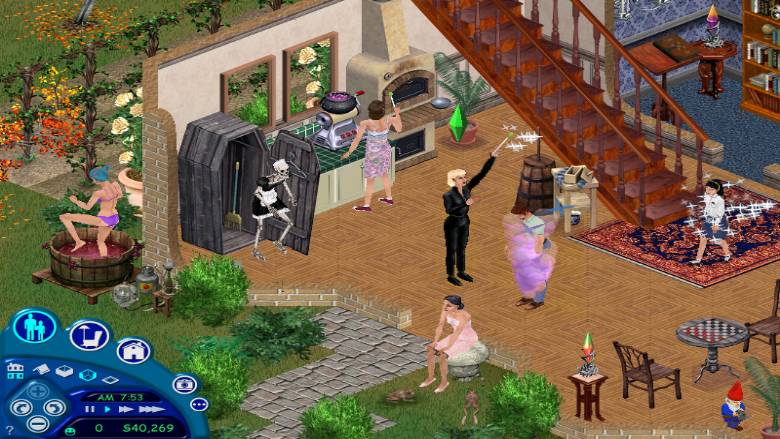
MaxisThe Sims (2000)
California-based Maxis Software was founded in 1987 by Will Wright and Jeff Braun in an effort to publish their Commodore 64 game SimCity on the PC, according to Kotaku. While their SimCity games would go on to become blockbusters, their numerous other Sim games wouldn’t sell nearly as much. Facing significant losses, Maxis agreed to be acquired by EA in July 1997. The acquisition was valued to be at $125 million, according to The New York Times.
After the release of SimCity 3000, the team got to work on what many considered a major gamble in the game market at the time: The Sims. The interactive dollhouse game would go on to sell 11.2 million copies, making it one of the best-selling PC games of all time just under Diablo III’s 12 million, World of Warcraft’s 14 million, Terraria’s 20 million, and Minecraft’s 27 million. It was so successful that a separate studio was established just for the games and their sequels and expansions, according to Kotaku.
Unfortunately, a long list of controversies secured the death knell for Maxis. Maxis’ next massive project, Spore, was released in 2008 to critical disappointment as well as a negative reaction to the game’s DRM measures, Kotaku reported. Wright left the company in 2009. The next game to court controversy was the SimCity reboot in 2013, with its always online requirement preventing tons of players from playing the game at launch due to server issues. It took a week for EA to get the game working, with the company disabling a bunch of features in order to do so as reported by Kotaku. Eventually an offline mode was created. The Sims 4 had similar problems and while it was made by a different studio the blame was still put on Maxis.
In March of 2015, EA shut down the main Maxis studio in Emeryville, California. EA said that they would consolidate Maxis IP development to their studios in Redwood Shores, Salt Lake City, Helsinki, and Melbourne locations. The consolidated team was them moved in September 2015 to work alongside EA Mobile.
13. EA Salt Lake (1992 – 2017)

EA Salt LakeTiger Woods PGA Tour 2001 (2000)
EA Salt Lake began as Headgate Studios, which was founded in 1992 by Vance Cook in Bountiful, Utah according to profiles on Moby Games and Gust. Cook was a programmer for Access Software, Inc. (later known as Salt Lake Games Studio, then Indie Studios, and then Indie Bult, Inc.), according to Moby Games. Access Software was known for their golfing simulators according to Giant Bomb, and Cooks experience led to Headgate Studios becoming one of the premiere golf simulator developers creating many well-reviewed entries in the Front Page Sports Golf, PGA Championship Golf, and Tiger Woods PGA Tour franchises. However their first product was the much more humble PentaCalc Pro, a scientific calculator for windows computers.
The studio was purchased by Sierra Entertainment in 1996 but then resold to Cook around 2000 according to Gust. That year the studio began publishing the Tiger Woods PGA Tour series through EA Sports, according to the studio’s website.
Then in November 2006, EA announced that it has purchased Headgate Studios, renamed it EA Salt Lake and refocused the company to develop games exclusively for the explosively popular Nintendo Wii, as GameSpot reported. The studio would coordinate its efforts with EA’s development teams in California along with the Madden series developers EA Tiburon in Florida. Cook would oversee the studio as executive producer while reporting to EA Redwood Shores and Maxis general manager Nick Earl. The studio would produce spin offs and expansions for The Sims 2 and The Sims 3 as well as many games licensed by toy company Hasbro including Nerf N-Strike, Littlest Pet Shop, Monopoly Streets, and Hasbro Family Game Night 4: The Game Show.
In July 2010, EA Salt Lake moved from their home in Bountiful to a new office building in downtown Salt Lake City, Utah, according to The Salt Lake Tribune.
Cook reportedly left the studio in 2010 according to Gust. He went on to create Bivy, a mobile app used to track outdoor trails and climbing spots, in 2012. The app is owned by Headgate Studios, according to the app’s website.
On January 30, 2014, IGN learned that EA laid off employees at EA Salt Lake. A source told the publication that 40 former employees migrated to Maxis in California while around 35 other employees were laid off, 20 of which were part of EA’s All Play label which was dedicated to digital games with a focus on mobile and social games according to GameSpot.
A representative from EA told IGN that EA Salt Lake was “becoming largely focused on mobile development, including The Sims and other projects. Recent shifts unfortunately resulted in the reduction of a few teams. As we look to match skills with opportunities, some staff will be offered other positions at EA, while others will leave the company.”
EA shut down EA Salt Lake in April 2017.
14. Visceral Games (1998 – 2017)
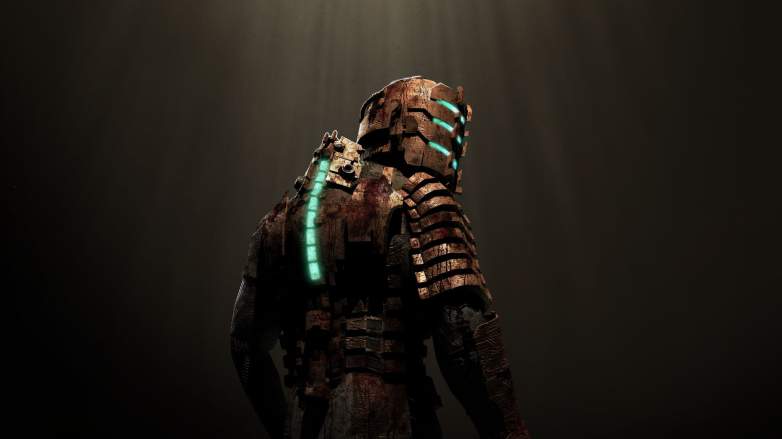
Visceral GamesDead Space (2008)
Visceral Games began as EA Redwood Shores in 1998, developing games at the same site location as EA’s corporate headquarters in Redwood Shores, California. Back then the studio didn’t have much of an identity as they were there to develop whatever EA thought would make them the most money that fiscal quarter as Schreier wrote in Press Reset. That meant a lot of licensed games such as CyberTiger, The Lord of the Rings: The Return of the King, MySims, and The Simpsons Game.
EA Redwood Shores finally found their identity when a team lead by Michael Condrey and Glen Schofield released Dead Space in 2008. Dead Space is one of the most beloved horror games of all time, regularly appearing on top 10 lists across publications big and small. The game expertly weaved action-packed shooter combat and tense psychological horror inspired by sci-fi horror classics like Alien and Event Horizon. With a genre-defining success under their belt, the studio changed their name to Visceral Games in 2009 as Kotaku reported.
With the critical and commercial success of Dead Space, EA wanted to turn it into a multimedia brand complete with comic books and even an animated film made by Simpsons studio Film Roman, according to Wired. However, neither the film nor its follow up were well received.
As expectations grew for the Dead Space franchise, so did EA’s influence over the business side of the games of Visceral which inevitably tarnished the reputations of the games. While Dead Space 2 was just as well regarded as the original, according to Schreier it was one of the first games to use the immensely reviled “online pass.” The online pass was the game industry’s attempt to kill the used games market, as they made no money off used games. New copies of games would contain a one time use code to access content, such as access to the multiplayer mode in Dead Space 2. Used games wouldn’t have the code, so customers would have to spend roughly $10 for their own online pass.
EA’s marketing also cast a shadow on the legacy of Visceral’s games. To promote Dead Space 2, EA released the “Your Mom Hates Dead Space 2” ad campaign where they showed footage of focus groups of older women cringing to the violent imagery of the game before ending with the tagline “Dead Space 2. It’s everything you love in a game, and your mom’s going to hate it.” While the ad campaign definitely succeeded in spreading word for the game, and definitely had its fans, others criticized the campaign for promoting stereotypes of gaming and of older women. Patent advocacy group Common Sense Media accused the ads of inappropriately targeting children with the tagline. Far more derided was the marketing for Visceral’s Dante’s Inferno. EA paid people to stand outside their offices with signs and pretend to protest the game’s depiction of hell. One month later, EA would apologize for the “sin to win” contest at San Diego Comic Con 2009. The contest told attendees to “commit acts of lust” and take pictures of themselves with booth babes, or sexualized women hanging around displays at conventions. EA apologized for the choice of wording, which many criticized as encouraging the harassment of women at the convention.
But what really sealed the fate of Visceral was the release of Dead Space 3 in 2013. According to Schreier, EA mandated that the game included co-op throughout the campaign as all the big games were doing that and also mandated that the horror elements be toned down. While EA had abandoned the online pass model by Dead Space 3, they still had an eye for making extra money. The game was one of the first to employ the controversial practice of incorporating free-to-play elements into full-priced games in order to get players to spend more money on microtransactions. Many agreed that the game was inferior to its predecessors, with the microtransactions being a common complaint. The game failed to meet sales expectations, with EA’s Frank Gibeau saying that the game needed to sell five million copies in order for the franchise to survive.
After the Dead Space franchise was effectively killed off, Visceral once again found themselves making games just to appease EA’s shareholders such as Battlefield Hardline.
EA shut down the studio in October 2017. Kotaku reported that the studio was working on a story-based, linear action-adventure title set in the Star Wars universe directed by former Uncharted director Amy Henning, but it will be reworked and moved to a different studio. EA’s Patrick Söderlund said in a blog post that due to feedback from players about “what and how they want to play” as well as “fundamental shifts in the marketplace,” they are going to pivot the design so that players could come back to and enjoy the game for a long time. EA later confirmed to Kotaku that development of the game will shift to a development team from across Worldwide Studios led by the EA Vancouver team. They will use much of the work made by Visceral. As for Henning, EA told the publication that they are “in discussions with her about her next move.”
Visceral’s development of their Star Wars game, code-named Ragtag, was marred by many problems as Kotaku’s Jason Schreier reported. The studio’s morale dived as half of the staff worked on Ragtag while half worked on expansion packs for Battlefield Hardline. “It was made very clear that the development team MVPs were the ones creating Star Wars magic while us lowly mortals slaved away on Hardline DLC,” one developer told Kotaku. The team was also understaffed with only 30 people working initially. The plan was to have the people working on Hardline DLC join later but even then the studio only had under 100 employees when a project of this caliber had teams of over 200. Not helping matters was the high cost of the studio’s San Francisco location as well as difficulties using the Frostbite engine, disagreements with EA over how to represent Star Wars, and clashes with the publisher in general. EA started laying off staff in May 2016. After many more turbulent months, the studio was shut down.

Comments
Studios EA Has Killed: A History